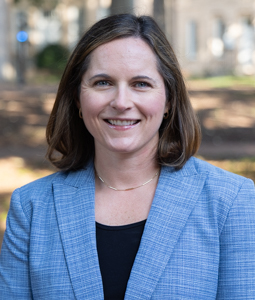Department of Psychology
Faculty and Staff Directory
Lindsay McCary, PhD
| Title: | Clinical Professor, Department of Psychology Director, Autism and Neurodevelopmental Disorders Clinic Carolina Autism and Neurodevelopment (CAN) Research Center |
| McCausland College of Arts and Sciences | |
| Email: | Lindsay.McCary@sc.edu |
| Office: | 1800 Gervais Street #118 |

Biography
I am a clinical professor in psychology and inaugural director of clinical services at the Carolina Autism and Neurodevelopment (CAN) Research Center. Through these roles, I have the opportunity to engage in research, clinical practice, leadership, and teaching and mentoring. I received my PhD in school psychology at the University of South Carolina and subsequently spent over 10 years at the University of Wisconsin, Madison where I engaged in a variety of leadership, clinical, and research capacities. My clinical expertise is in the area of assessment and intervention for individuals with autism and related neurodevelopmental conditions.
Research & Scholarship
As a clinician-scientist, my research and scholarship have been dedicated to improving systems of care for individuals with autism and neurodevelopmental disabilities. At the core of my work is a commitment to increasing access to high-quality, evidence-based services while simultaneously enhancing the professional capacity of clinicians and service providers. Throughout my career, I have integrated clinical practice, scholarly inquiry, and interdisciplinary collaboration to address critical gaps in care and improve outcomes for individuals with autism and neurodevelopmental disabilities. My scholarship has spanned several key areas, including expanding access to clinical services, improving early diagnosis and intervention, addressing the mental health needs of autistic individuals, and advancing pre-professional and post-professional training in developmental disabilities.
One of the focus points of my scholarship has been developing and evaluating training programs aimed at increasing the competencies of professionals who serve individuals with autism and related conditions. As demand for trained clinicians continues to rise, I have created training programs designed to enhance the knowledge and skills of healthcare providers, school professionals, and therapists from a variety of disciplines. These programs emphasize not only diagnostic accuracy but also the application of evidence-based interventions in real-world settings. I have worked extensively with physicians, school psychologists, speech language pathologists, occupational therapists, and behavioral therapists, promoting interdisciplinary collaboration to improve service delivery systems. I aim to create scalable, sustainable models of care that foster long-term professional development and improve outcomes for the autistic population.
Additionally, given the importance of early identification, my research has focused on identifying and addressing barriers to early diagnosis and timely access to services, particularly for underserved communities. I have led community-based studies and quality improvement projects aimed at refining early screening tools and diagnostic protocols to ensure that children receive appropriate care as soon as possible.
A central aspect of my recent scholarship and clinical practice has focused on the mental health needs of autistic individuals, a historically underexplored area in both research and practice. Autistic individuals are at increased risk for anxiety, depression, and other mental health challenges, yet often face significant barriers to receiving appropriate care. My work has included developing and evaluating social-emotional group interventions that provide individuals with ASD the tools to enhance emotional regulation, develop social skills, and build coping strategies. These programs aim to address the broader social and emotional needs of autistic individuals, ultimately resulting in a positive sense of self from a neurodiversity-affirming lens.